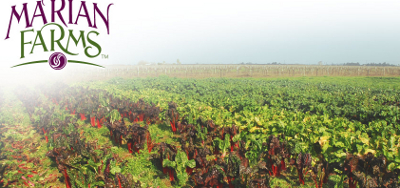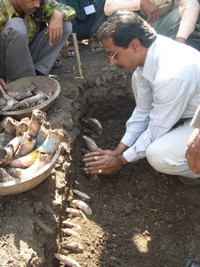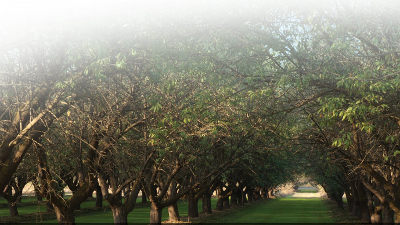
Nonini on biodynamics
 One of the things I'd hoped
to get out of the ACRES USA conference was an opportunity to answer
questions like --- is biodynamics kooky or is it a valid method of
increasing the biological stability of a farming ecosystem? After
listening to Gena Nonini's "Biodynamic journey" presentation, I'm
leaning toward the answer --- biodynamics is both.
One of the things I'd hoped
to get out of the ACRES USA conference was an opportunity to answer
questions like --- is biodynamics kooky or is it a valid method of
increasing the biological stability of a farming ecosystem? After
listening to Gena Nonini's "Biodynamic journey" presentation, I'm
leaning toward the answer --- biodynamics is both.
Nonini grew up on a
conventional (aka chemical) farm in California, so her journey in the
biodynamic direction wasn't well received by her family and
neighbors. She leased 90 acres of wine grapes from her parents in
1991, and soon realized that chemical farming was terrible for her
health, and wasn't going to allow her to make a living either.
 Nonini's response was to
slowly but surely start focusing on organic inputs and on diversifying
her operation. She followed the biodynamic principle of creating
"preparation 500" --- filling a cow horn with cow manure and burying it
in the ground to age for a few months before applying the compost to
her soil. She also added citrus trees and vegetables to the farm,
figuring the biodiversity would help prevent pests organically and
would also ease the financial strain if one crop failed.
Nonini's response was to
slowly but surely start focusing on organic inputs and on diversifying
her operation. She followed the biodynamic principle of creating
"preparation 500" --- filling a cow horn with cow manure and burying it
in the ground to age for a few months before applying the compost to
her soil. She also added citrus trees and vegetables to the farm,
figuring the biodiversity would help prevent pests organically and
would also ease the financial strain if one crop failed.
In her lecture, Nonini
argued that the health of biodynamic farms can't be explained by
"substances", but instead by "forces". (Yes, she even talked
about communing with the gnomes.) This is where she lost me, and
why I've considered biodynamics kooky in the past. I'm quite
willing to believe that preparation 500 might be very valuable to soil
--- maybe the horn acts a bit like biochar and increases microorganism
populations dramatically in the enclosed manure. But creating a
spiritually-based agriculture system seems like a copout to me. I
always want to know how things operate so I can decide when to use them
and how to make them work even better.
 Biodynamic agriculture has
developed a large following as the term "organic" continues to be taken
over by large agriculture companies that care more about the bottom
line than about the health of the farm ecosystem. However, I'm
afraid I'll stick to the term "permaculture" for now if Nonini is a
typical example of the biodynamic movement. I've got another
biodynamic talk to listen to, though, so maybe I'll change my tune in
the next ACRES lunchtime series.
Biodynamic agriculture has
developed a large following as the term "organic" continues to be taken
over by large agriculture companies that care more about the bottom
line than about the health of the farm ecosystem. However, I'm
afraid I'll stick to the term "permaculture" for now if Nonini is a
typical example of the biodynamic movement. I've got another
biodynamic talk to listen to, though, so maybe I'll change my tune in
the next ACRES lunchtime series.
| This post is part of our ACRES conference lunchtime series.
Read all of the entries: |
Want more in-depth information? Browse through our books.
Or explore more posts by date or by subject.
About us: Anna Hess and Mark Hamilton spent over a decade living self-sufficiently in the mountains of Virginia before moving north to start over from scratch in the foothills of Ohio. They've experimented with permaculture, no-till gardening, trailersteading, home-based microbusinesses and much more, writing about their adventures in both blogs and books.
Want to be notified when new comments are posted on this page? Click on the RSS button after you add a comment to subscribe to the comment feed, or simply check the box beside "email replies to me" while writing your comment.

A pile of crap will eventually turn into useful compost. Not because of unknown "forces" or "gnomes". But because of well-understood natural processes, that can be adjusted if necessary.
Not because of unknown "forces" or "gnomes". But because of well-understood natural processes, that can be adjusted if necessary.
I think that for alternatives to the current energy- en resource intensive monocultures to flourish, it is necessary to ditch the pseudoscience in favour of proper methodical improvement through experiments.
So keep up the good work you two! Hopefully one day the Walden Effect will be the yardstick by which the others are measured.
Roland --- I was curious to hear what you thought about biodynamics since my understanding is that it's bigger in Europe than here. As you can tell, I agree with you to some extent. But I never like to throw the baby out with the bathwater --- I think that a lot of the hands-on portions of biodynamics might make scientific sense if people bothered to research why they worked. And I like the idea of trying to cycle nutrients within your farm.
And maybe some people have researched the science behind biodynamics. I just listened to the one lecture! If fans of biodynamics are reading, I hope you'll chime in with your references.
In short, the methods may work but the explanations make no sense. That's why the latter should be separated from the former and discarded.
Have you ever tried reading Steiners lectures on biodynamics? I've struggled (in vain) to find any explanations that makes sense in them. They do redline my baloney detector quite nicely, though.
This isn't meant to be a coherent paragraph leading anywhere; it's just a series of unrealted responses to your post.
Open up the brain, and show me exactly where the mind is located?
To me, that sums up biodynamics.
They also talk about planetary influences. It sounds a lot like astrology, which I generally find quite interesting but not nearly as reliable or generative.
A book titled What is Biodynamics? is a good intro to the fundamentals of biodynamics. The introduction itself is worth a read. What the book tries to do is give the necessary background to the Agriculture Course where Steiner outlined Biodynamics. The reason this is important is that without a framework of where Steiner is coming from, people new to the subject are liable to make claims that he has, in his Ag Course, a muddled concoction of vague ideas and quackery. In truth he had very rigorous methods of understanding and interpretation, however since they are unconventional methods he is often written off out of hand. He didn't decide to teach the Ag Course to a bunch of people who had never heard him before--they were people who had been to many of his lectures before and actually understood many fundamentals when he spoke about them in a sort of shorthand. Today not many people are willing to invest the time and energy into reading so much dense material to understand what Steiner does and why.
This might sound like I'm a gung-ho biodynamic nut. I'm not--I've been reading Steiner for a while and only recently have I started reading more about this subject. It does sadden me that you think coupling spirituality with agriculture is a copout--working with the earth is an incredibly spiritual act. You may not call it this so that may be the reason you think it's a copout, or maybe it's not the right spirituality.
Doc --- I'll bet you'll disagree with today's lunchtime post even more then....
J --- I think you've got some very good points. I was trying to explain more with my throwing out the baby with the bathwater comment, but wasn't having any luck articulating it yesterday. After reading your comment, I think what I wanted to add to my post is --- I think that anyone who spends serious time observing nature has insights to share, whether they have a clue how to scientifically test what might have caused the things they observed or not. And I get the feeling that farmers who follow biodynamics are good at observing, which is why my gut says that it's worth testing out why some of their preparations work.
I still think it's worth doing the testing, though, before blindly following. Every patch of earth is so different --- if you don't know why something works for someone else, it probably won't work for you. (For example --- my swales. )
)
Chris --- Thank you! That's some very good context. It sounds like that book would be a better point for me to start from than a few random lectures.
I think I wasn't entirely clear when I said that I thought coupling spirituality with agriculture was a copout. I don't mind the spirituality --- I certainly get a lot of joy from being in the garden and don't see any reason other shouldn't link it to a religion or spirituality of their choosing. I simply think that if you base decisions on spirituality rather than seeking out real understanding, you're not going to do as good a job in the long run. (See my comment to J above.)
I'd recommend starting with maria thun's basic book on biodynamics. Pretty simple and accessible. It feels like Steiner was onto something and approached it without needing to pull things apart in the mechanical sense that we view living organisms these days. I think that once we investigate far enough in the mechanistic system to have a BASIC understanding we stop investigating and apply it as if it is the WHOLE system. The corner cases are lost. The outliers are disregarded. This, to me, is dangerously shortsighted in an attempt to move forward with new methods and how humanity blunders into dangerous and toxic/harmful situations.
That said I think biodynamics needs to adjust because it holds one very very valuable thing, knowledge that is integrated into spiritual systems survives longer than most other knowledge that humans accumulate. That alone becomes a reason to integrate good scientific knowledge about healthy farming and healthy living into a spiritual system.
Note: I have a biology degree and struggle on an emotional level to "accept" and "trial" something that is as un-explained as much as biodynamics is. That said, I'm planting on maria thun's schedule this year in a "let's see what happens" experiment. There is one really good thing to following her calendar. I can ONLY plant SO MUCH in a day. Her calendar acts as a brake on my enthusiasm and exhaustion in the spring planting season. There is a bit more calm to my spring, a bit more ease to my schedule, I'm still getting the day job done at the same time this year!! yippeee!
That benefit alone might make me follow her calendar again next year.
I greatly look forward to your additional impressions of biodynamics.